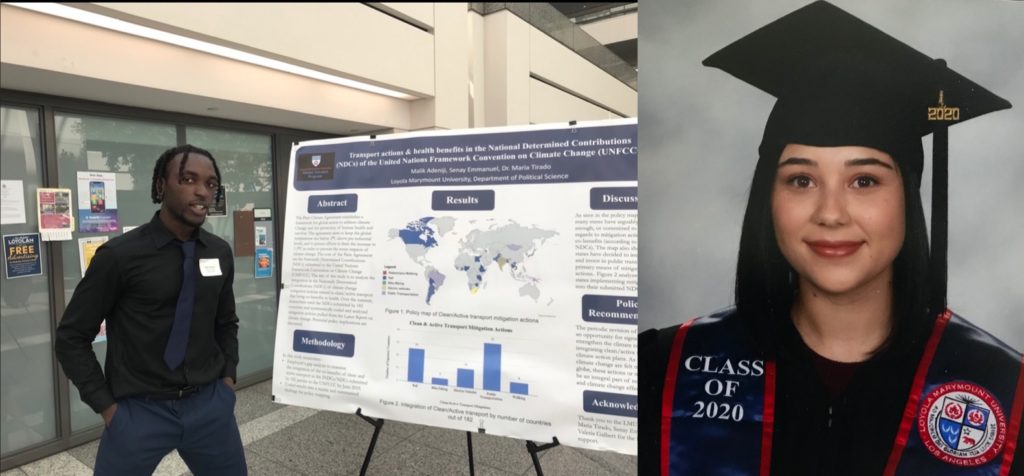How does one become globally engaged in a world of lockdowns, travel restrictions, and even closed borders? Of the many challenges posed by COVID-19, this one in particular has stymied international relations majors who had planned to spend their summers abroad. Although much of the world is on hold, the work of many nonprofit organizations continues. And despite the unprecedented circumstances of this moment, Loyola Marymount University students are answering the call by offering to work remotely.
For Samantha Sepulveda and Malik Adeniji, both International Relations majors, LMU’s Study Abroad Office played a pivotal role in helping them to make summer plans, and then pivot. Samantha’s original study abroad program was canceled, but the office offered her an alternative. After being asked about her interests, ideal work environment, and the values she looks for in a company, Samantha was paired with the Strategic Metropolitan Plan of Barcelona (PEMB), a nonprofit that works to mediate between the needs of the city and the needs of the public. Similarly, when Malik’s plans to study abroad this fall began to look uncertain, one of LMU’s study abroad advisors, Wilson Potts, suggested he explore a global internship. As the son of small-business owners, Malik felt personally drawn to the mission of the Jordan Health Aid Society (JHAS) and its work helping small businesses. Malik also appreciates that he can work in “a business-advisory role on an international scale,” which connects his interest in business sustainability and global career aspirations.
Both PEMB and JHAS have continued to serve their respective communities, but have stretched, adjusted, and scaled their work in recent months. Under normal circumstances, Samantha would have been focused on hands-on community involvement, while Malik would have been meeting with small business owners in person, as well as seeing how their businesses operate to get a better understanding of how to help. COVID-19, however, changed the location of where their work unfolded, as well as the nature of the work itself. Samantha spent her summer at home in Rancho Cucamonga, California, researching the impact of the pandemic on the retail industry so that PEMB can better predict the needs of the city and its people, and Malik logged in from Honolulu, Hawaii, to study the effects of COVID-19 on small businesses around the world in order to help small businesses better adapt to the crisis. Despite drastic time differences, they still managed to successfully assimilate into new cultures and gain unique international perspectives and skills.
The experience of working remotely for an internationally-based organization demonstrated to Samantha that “work environments are completely different depending on the values people uphold in that culture.” For her, that meant disengaging from the fast-paced environments of American offices and adjusting to a more casual Spanish workplace, where time and small-talk are viewed differently. She credits her International Relations major for helping her bridge the cultural difference: “International Relations at LMU spreads across all sectors and brings people together… It teaches us to see past the differences and see all the things we have in common.” Malik also believes that his International Relations major prepared him for this internship experience and professional growth. In particular, he thanked Professors Ramos, Bertucci, and Sariolghalam for providing “a very strong knowledge base of the theoretical and practical side of humanitarianism.”
Moving forward, Samantha and Malik want to continue pursuing opportunities in the field of International Relations. “I plan on going to law school to get my JD and my masters in International Affairs,” says Samantha. “I want to learn how governments work together, the ins and outs of our international communities. I would love to work in an embassy representing my country in other countries, trying to build bridges across different cultures.” Malik hopes to become an advisor or consultant in international affairs. “My dream job would probably be a presidential advisor on international affairs or to work in the World Bank and focus on state development projects,” said Malik.
Samantha Sepulveda and Malik Adeniji might not have been able to study abroad, but that hasn’t stopped them from gaining valuable international work experience. Although COVID-19 has had many negative impacts as the worst health and economic crisis in decades, it has also acted as a catalyst, forcing everyone to find new ways to do meaningful work and engage as a global community.




